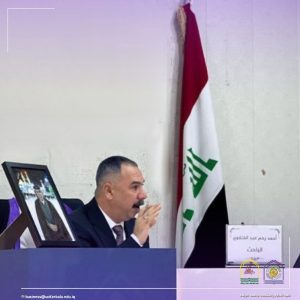The impact of double economic shocks on foreign currency reserves in Iraq
A Thesis To the Council of the College of Administration and Economics- University of Karbala, which is part of the requirements for obtaining a master’s degree in economic sciences
Submitted By
Zainulabdeen Mohammed Mayih AL-Mousawi
Supervised by
Dr
Khudair Abbas Hussein Al-Waeli
Abstract:
Double economic shocks are one of the important topics because of the changes and imbalances in the macroeconomic balance, and the double shock is the simultaneous occurrence of two shocks at the same time, in the form of external shocks and internal shocks, and their results are negative and imbalances occur in the balance of payments and budget deficit, and one of the most vulnerable countries to double shocks are rentier countries as a result of direct dependence on one revenue and lack of diversification of revenues, as when a double negative shock will lead to a decline in oil revenues and a decline in foreign reserves, and that the need to use foreign reserves in order to reach stability and balance of the economy, the research aims to indicate the impact of double economic shocks and their negative impact on the depletion of foreign reserves. The problem of research is focused on the dependence of the Iraqi economy on oil revenues in the formation of public revenues and foreign reserves, and that any decrease in these revenues due to oil price shocks will affect the size of foreign currency reserves, so the problem can be formulated with the following question: do double economic shocks affect currency reserves in Iraq.
The research is based on the hypothesis that double economic shocks have a negative impact on foreign currency reserves in the Iraqi economy. A number of conclusions were reached, the most important of which were the results of statistical analysis showed a negative impact on foreign currency reserves in times of double shocks that lead to a decline and decrease in foreign reserves, and a number of recommendations were made, the most important of which is to use part of the foreign reserves for foreign investment and in aspects where the risk is low in countries with a high credit rating, in order to ensure obtaining foreign revenues to be added to oil revenues and work on allocating part of the excess foreign reserves to build a sovereign fund aimed at using these reserves in times of shocks.































































